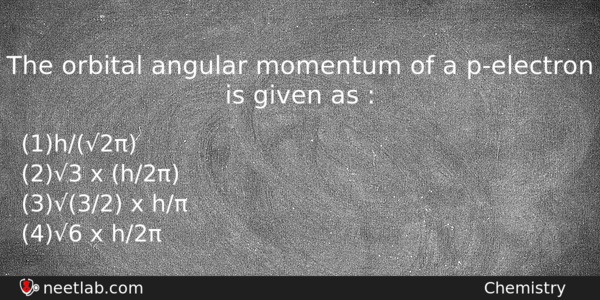| ⇦ | 
| ⇨ |
The orbital angular momentum of a p-electron is given as :
Options
(a) h/(√2π)
(b) √3 x (h/2π)
(c) √(3/2) x h/π
(d) √6 x h/2π
Correct Answer:
h/(√2π)
Explanation:
Orbital Angular Momentum = h/(2π) x √(l(l+1)). For p orbital, l=1. so => h/(2π) x √2 =? h/(√2π)
Related Questions: - The reaction CH₃ – Br + 2Na + Br – CH₃ → CH₃ – CH₃ is called
- Ammonia can be dried by
- Which one of the following statements for the order of a reaction is incorrect
- The structure of benzene is
- The common oxidation state shown by lanthanides in their compounds is
Question Type: Memory
(964)
Difficulty Level: Easy
(1008)
Topics: Structure of Atom
(90)
Subject: Chemistry
(2512)
Important MCQs Based on Medical Entrance Examinations To Improve Your NEET Score
- The reaction CH₃ – Br + 2Na + Br – CH₃ → CH₃ – CH₃ is called
- Ammonia can be dried by
- Which one of the following statements for the order of a reaction is incorrect
- The structure of benzene is
- The common oxidation state shown by lanthanides in their compounds is
Question Type: Memory (964)
Difficulty Level: Easy (1008)
Topics: Structure of Atom (90)
Subject: Chemistry (2512)
Important MCQs Based on Medical Entrance Examinations To Improve Your NEET Score
18000+ students are using NEETLab to improve their score. What about you?
Solve Previous Year MCQs, Mock Tests, Topicwise Practice Tests, Identify Weak Topics, Formula Flash cards and much more is available in NEETLab Android App to improve your NEET score.
Share this page with your friends

Leave a Reply